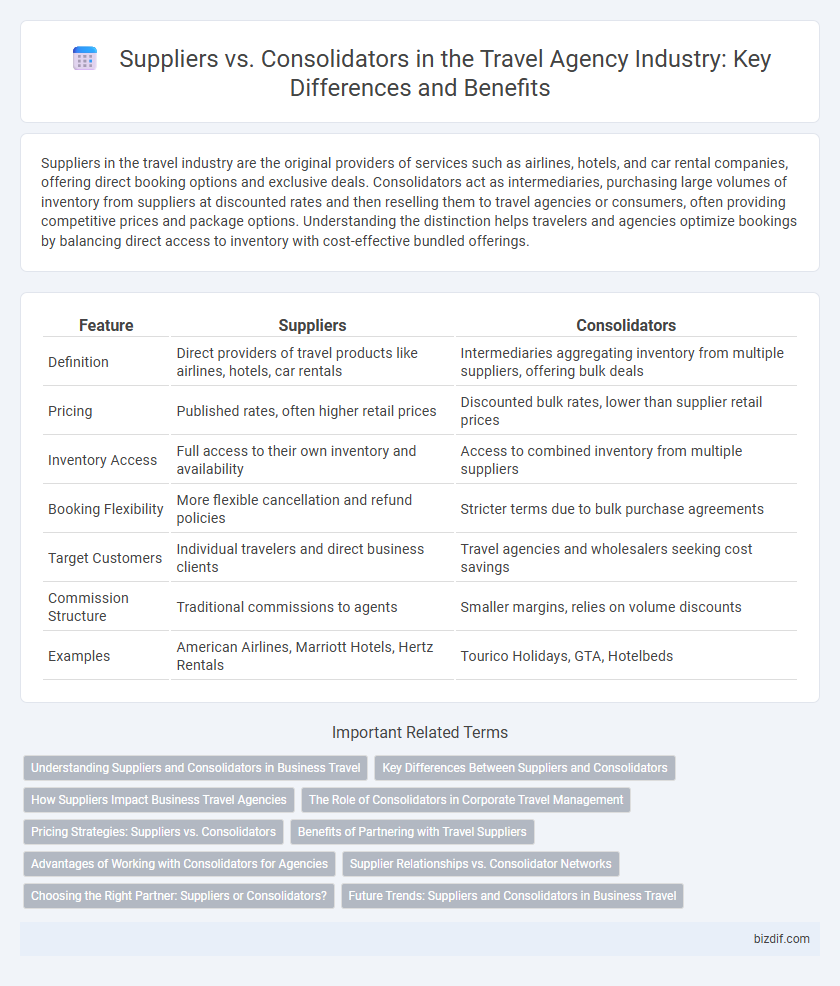Suppliers in the travel industry are the original providers of services such as airlines, hotels, and car rental companies, offering direct booking options and exclusive deals. Consolidators act as intermediaries, purchasing large volumes of inventory from suppliers at discounted rates and then reselling them to travel agencies or consumers, often providing competitive prices and package options. Understanding the distinction helps travelers and agencies optimize bookings by balancing direct access to inventory with cost-effective bundled offerings.
Table of Comparison
| Feature | Suppliers | Consolidators |
|---|---|---|
| Definition | Direct providers of travel products like airlines, hotels, car rentals | Intermediaries aggregating inventory from multiple suppliers, offering bulk deals |
| Pricing | Published rates, often higher retail prices | Discounted bulk rates, lower than supplier retail prices |
| Inventory Access | Full access to their own inventory and availability | Access to combined inventory from multiple suppliers |
| Booking Flexibility | More flexible cancellation and refund policies | Stricter terms due to bulk purchase agreements |
| Target Customers | Individual travelers and direct business clients | Travel agencies and wholesalers seeking cost savings |
| Commission Structure | Traditional commissions to agents | Smaller margins, relies on volume discounts |
| Examples | American Airlines, Marriott Hotels, Hertz Rentals | Tourico Holidays, GTA, Hotelbeds |
Understanding Suppliers and Consolidators in Business Travel
Suppliers in business travel include airlines, hotels, and car rental companies that provide direct inventory and services to travel agencies. Consolidators purchase large volumes of travel products from suppliers at discounted rates and resell them to agencies, offering competitive prices and exclusive deals. Understanding the roles of suppliers and consolidators enables travel agencies to optimize pricing strategies and improve service offerings for corporate clients.
Key Differences Between Suppliers and Consolidators
Suppliers in the travel industry directly provide services such as airlines, hotels, and car rental companies, offering inventory and pricing to travel agencies. Consolidators act as intermediaries, purchasing large blocks of inventory from suppliers at discounted rates and reselling them to travel agencies, often providing better pricing and exclusive deals. The key differences lie in their roles: suppliers control the original inventory and service quality, while consolidators specialize in bulk buying and price negotiation to benefit travel agencies and their customers.
How Suppliers Impact Business Travel Agencies
Suppliers, including airlines, hotels, and car rental companies, directly impact business travel agencies by determining the availability, pricing, and quality of travel services offered to corporate clients. Their negotiation power influences commission rates and exclusive deals, shaping the agency's profitability and competitive edge. Strong supplier relationships enable agencies to secure tailored travel solutions, ensuring seamless corporate travel management and enhanced client satisfaction.
The Role of Consolidators in Corporate Travel Management
Consolidators play a crucial role in corporate travel management by aggregating inventory from multiple suppliers to offer competitive rates and wider options to businesses. They streamline the booking process, providing access to discounted airfare, hotel rooms, and car rentals that are often unavailable through direct suppliers. Leveraging consolidators helps corporate travel managers optimize budgets, enhance travel policy compliance, and gain access to enhanced reporting and support services.
Pricing Strategies: Suppliers vs. Consolidators
Suppliers, such as airlines and hotels, set base pricing directly influenced by operational costs, seasonal demand, and brand positioning, offering standard rates to travel agencies and consumers. Consolidators purchase inventory in bulk from multiple suppliers, enabling them to negotiate significant discounts and offer lower prices or exclusive deals to travel agencies. This bulk-buying approach allows consolidators to implement aggressive pricing strategies that create competitive advantages and increase market reach for travel agencies.
Benefits of Partnering with Travel Suppliers
Partnering with travel suppliers ensures access to exclusive inventory, competitive rates, and real-time availability, enabling travel agencies to offer tailored and up-to-date packages. Direct relationships with airlines, hotels, and tour operators boost credibility and streamline communication, reducing booking errors and enhancing customer satisfaction. Leveraging supplier partnerships increases profit margins by securing special commissions and promotional deals unavailable through consolidators.
Advantages of Working with Consolidators for Agencies
Working with consolidators offers travel agencies access to deeply discounted bulk rates on flights, hotels, and packages that are not available through direct suppliers. Consolidators streamline booking processes by providing a wide inventory from multiple suppliers under one platform, enhancing efficiency and reducing administrative costs. Agencies benefit from increased commission margins and exclusive deals, enabling competitive pricing and improved client satisfaction.
Supplier Relationships vs. Consolidator Networks
Travel agencies benefit from strong supplier relationships by securing exclusive deals, personalized service, and direct communication with airlines, hotels, and tour operators, enhancing client satisfaction. Consolidator networks offer access to bulk pricing and a broad range of inventory but may lack the flexibility and customization found in direct supplier partnerships. Prioritizing supplier relationships enables agencies to build trust, negotiate better terms, and deliver unique travel experiences beyond standard consolidator offerings.
Choosing the Right Partner: Suppliers or Consolidators?
Choosing the right partner in the travel industry involves weighing the advantages of suppliers versus consolidators. Suppliers, such as airlines and hotels, offer direct access to inventory and often provide better control over pricing and availability, while consolidators aggregate multiple suppliers' products to offer competitive rates and package deals. Travel agencies benefit from consolidators by gaining access to discounted bulk rates and diverse options, yet working directly with suppliers can enhance customization and strengthen industry relationships for exclusive offers.
Future Trends: Suppliers and Consolidators in Business Travel
Suppliers are increasingly integrating advanced technology such as AI and blockchain to streamline bookings and enhance transparency in business travel. Consolidators leverage big data analytics and dynamic pricing models to offer competitive, tailored travel solutions for corporate clients. The future of business travel hinges on collaboration between suppliers and consolidators, driving efficiency, cost-effectiveness, and personalized service delivery.
Suppliers vs Consolidators Infographic

 bizdif.com
bizdif.com